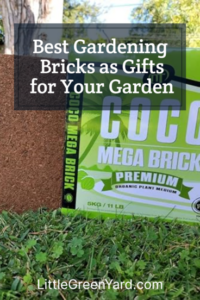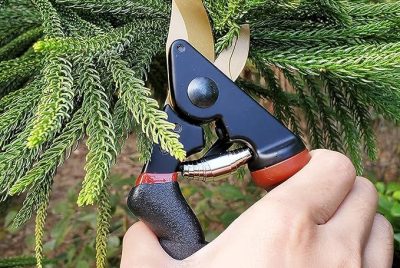Best Gardening Bricks as Gifts for Your Garden
In this article, I want to introduce you to this exceptional product – coconut coir gardening bricks, which are fantastic in replacing traditional soil medium or even peat moss. There are several benefits for gardening which you’ll want to incorporate for your garden to flourish.
What is Coco Coir?
Coco coir, also known as coconut coir, is a remarkable natural growing medium derived from the husk of coconuts. It’s eco-friendly, sustainable, and versatile.
The more durable brown coir comes from mature coconuts and is widely used (this is what you see on eCommerce and retail stores too), while white coir comes from green coconuts and is primarily used to make products such as fishing nets.
Most coir is processed where coconuts are grown. While coconuts grow in nearly 100 countries around the globe, most coir, after being separated from the coconut husk by soaking it in water (a process called retting), is distributed in its raw form by its main exporters, India and Sri Lanka. Indonesia, Malaysia, the Philippines, Thailand, and Vietnam export coir to a lesser extent. For gardening and composting use, coir is often packed into gardening bricks so that it is easy to transport. It is also bound tightly so that it is mess-free.
But what makes it so special?
Using Coco Coir Gardening Bricks in Your Gardens
Gardens come in all shapes and sizes, and coco coir is a versatile medium that caters to all of them. Whether you have raised beds, container gardens, or traditional in-ground plots, coco coir can be used. Its fine texture ensures excellent aeration and water retention, creating the perfect environment for your plants.
Coir is an excellent medium for gardening in that it holds moisture while allowing air to pass through. This enables plants to stay hydrated without developing rot or fungus. It is also resistant to garden pests such as moths. Once it has dried out, coir absorbs water better than peat moss during water reapplication, and it maintains more moisture.
Gardening Tip:
Mixing it with your existing soil is a gardening hack I highly recommend.
Seeds, Seedlings, and Coco Coir
As a gardening enthusiast, starting plants from seeds is one of the most exciting aspects of the hobby. Coco coir plays a vital role in this process. It provides a gentle yet effective medium for young plants to establish their roots. You can use it as a standalone medium for seedlings or blend it with other potting mixes to create the perfect environment for their growth.
You can also mold it into cups to separate the seedlings!
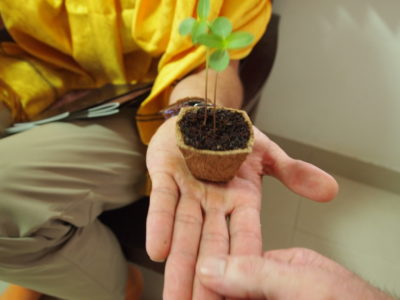
Composting with Coco Coir
Composting is an essential practice for sustainable gardening. Coco coir can be an invaluable addition to your compost bin. It serves as an excellent carbon source, balancing the nitrogen-rich materials like kitchen scraps and grass clippings. Composting with coco coir results in a nutrient-rich soil amendment that will work wonders for your garden.
Environmental Benefits of Coco Coir
As a gardening enthusiast, I’m not just concerned about my garden’s health; I care about the environment too. Coconut coir is not only beneficial for your garden but also for the planet. It’s renewable, biodegradable, and an eco-friendly alternative to peat moss. By choosing coco coir, you’re reducing your carbon footprint and contributing to a greener Earth.
Frequently Asked Questions about Coco Coir
- Can coco coir be reused?
- Yes, coco coir can be reused. After its initial use, you can rehydrate and fluff it up for another round of gardening.
- How often should I water my garden with coco coir?
- The watering frequency with coco coir depends on various factors, including plant type and environmental conditions. Generally, you’ll water less frequently compared to traditional soil, as coco coir retains moisture well.
- Is coco coir pH-neutral?
- Yes, coco coir is pH-neutral, making it a versatile medium for a wide range of plants. You can adjust its pH to suit specific plant needs if required.
- Can coco coir be used for hydroponics?
- Absolutely! Coco coir is an excellent medium for hydroponic systems. Its water retention properties make it a popular choice for hydroponic gardening.
- Does it attract pests or insects?
- Coco coir is naturally resistant to pests and insects, making it a safe choice for your garden.
Recommended Products
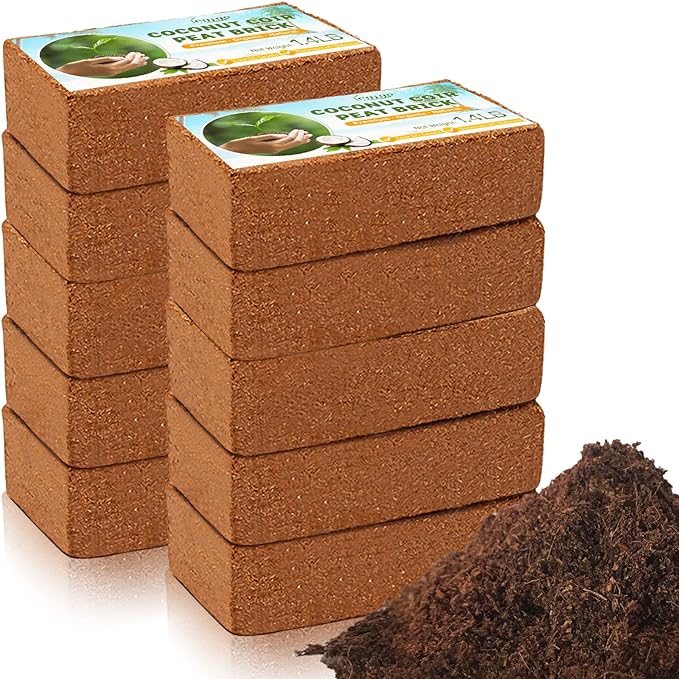
Legigo Pack of 10 Organic Coco Coir Bricks- 100% Natural Compressed Coco Peat Brick Coconut Fiber Substrate with Low EC&pH Balance, Plant Soil Enhance Root Growth for Herbs, Flowers, House Plants
To use, mix this with perlite to make a nice well drained mix. The coir is fairly finely milled and holds a lot of water. It’s definitely pH neutral because when i tested the runoff, it was right around pH7 (which is the same as my well water). The individual bricks appear to be handmade and as such are in fact different sizes.
If it’s your first time, I’ll recommend you to buy the multi-pack. It’ll also do a good job in supporting my cuttings while they root.
Fertazin Premium Coco Coir Brick – 10 Pound / 4.5KG Coconut Coir – 100% Organic and Eco-Friendly – OMRI Listed – Natural Compressed Growing Medium – Potting Soil Substrate for Gardens, Seeds and Plants
This is a really large block, so make sure you need a lot of it. It’s considered to be great quality and quantity for the price. The only down side is that even after soaking the block it was a little harder for to separate. Use a flat-headed screw driver, it helps to break it apart!
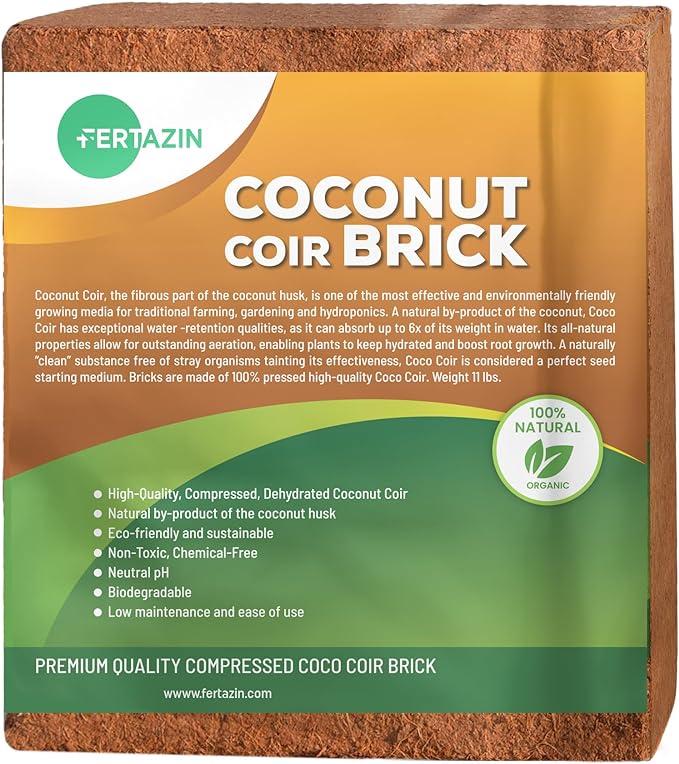
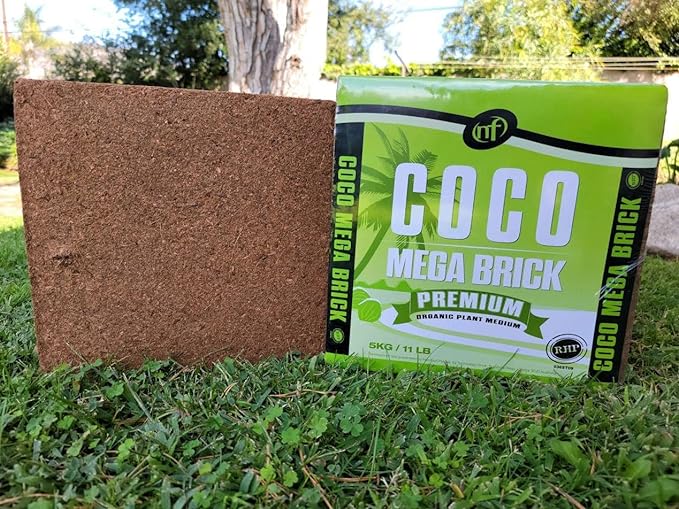
Nutrifield Coco Coir Mega Brick Organic Coconut Coir 11 Pound Coco Fiber Compressed Block Pre Washed Buffered RHP Cert Potting Soil Indoor Outdoor Garden Use Vegetable Flower Seed Starter
There are 2 size options available, so if you’re getting this large single brick to fluff, you really get a lot for a low cost. If you need smaller amounts then this is not for you because you have to add water to the whole brick to get it apart as there are no dividing sections to do only part of the whole brick at a time. As a result, you will have a lot of wet material left over that you have to use soon.
Mountain Valley Seed Company Minute Soil – Compressed Coco Coir Fiber Grow Medium – 1 Block = 15 Gallons of Potting Soil (Approx Wheelbarrow Full) – Gardening, Flowers, Herbs, Microgreens – Add Water – Peat Free – OMRI Organic
I love this because this has the most number of size options – all 10 sizes available! So you can definitely select the right one for your garden’s needs.
To help avoid mold during storage, dry the expanded product in the oven on a low temperature (no hotter than 180 F). Higher temperatures release toxins into the soil like ammonium which are bad for plants so if you do this, keep the oven no hotter than 180 F. Then once you are ready to use it, combine it with 1 part vermiculite for 6 parts coco coir for an especially fluffy grow medium.
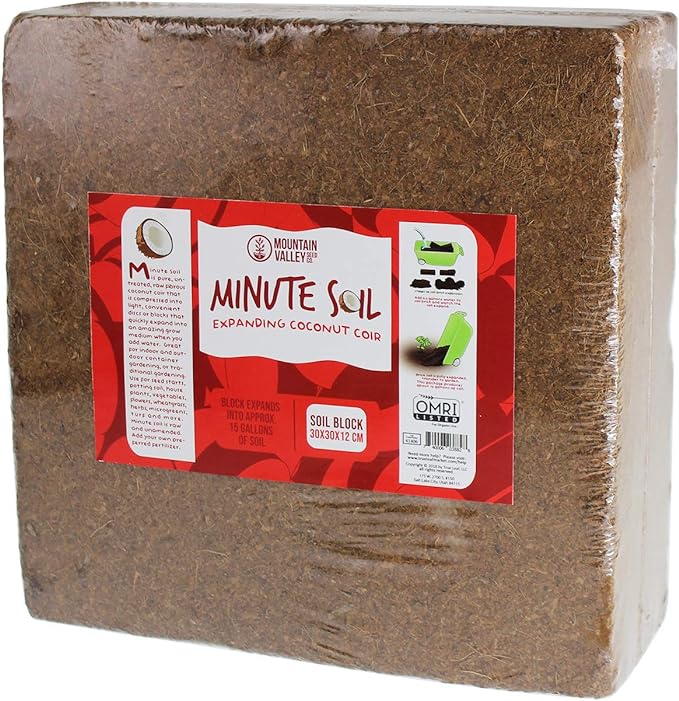
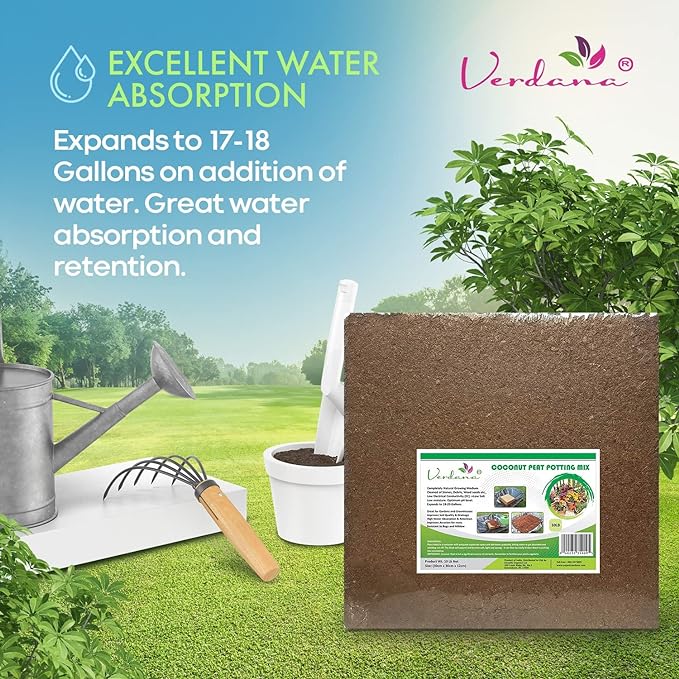
Verdana Coconut Fiber Potting Mix – 10 Lb Compressed Block Brick – Coco Coir, Coco Peat, Coir Pith – Alternative to Peat Moss – Soilless Growing Medium – Low EC, Optimum pH, High Expansion
Great for leafy plants, orchids, succulents, flowering plants, vegetables, annuals, or perennials. When expanding the coco coir, it’s recommended to use a big bucket or container (I’ve seen others use their wheelbarrow). I used the coco coir to grow microgreens in a 10×20 tray, so I advise expanding the brick before transferring it to the smaller container.
Why Choose Premium Coco Coir Gardening Bricks?
Not all coco coir products are created equal – do read the reviews carefully, lest you’ll see surprises (like insect eggs, larvae, fungi etc). Premium coir gardening bricks can easily replace soil and peat moss so it’s really a gardener’s dream come true. Also, it’s a versatile, eco-friendly, and reliable medium that fosters healthy plant growth, reduces your carbon footprint, and caters to various gardening needs. As a gardening enthusiast, I can confidently say that this product has significantly improved my gardening experience.
